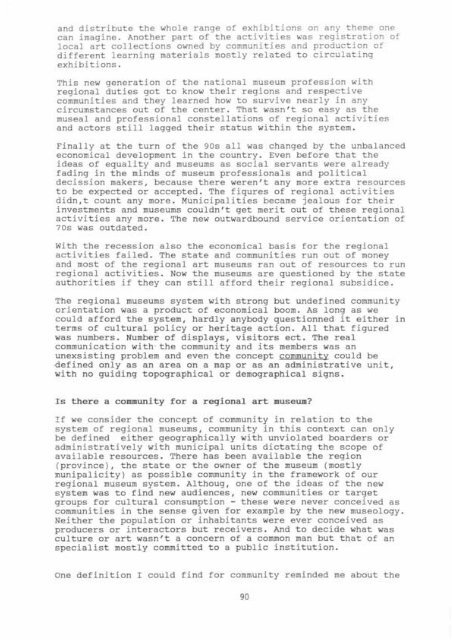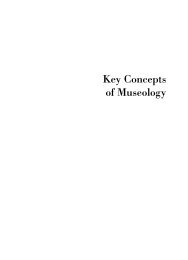ISS 25 (1995).pdf - The International Council of Museums
ISS 25 (1995).pdf - The International Council of Museums
ISS 25 (1995).pdf - The International Council of Museums
Create successful ePaper yourself
Turn your PDF publications into a flip-book with our unique Google optimized e-Paper software.
and d istribute the whole range <strong>of</strong> e xhib i tio ns on any theme one<br />
can imagine. Another part <strong>of</strong> the a ctiviti e s was registra t ion <strong>of</strong><br />
local art collections owned by commun i ties a nd p r oduc t ion <strong>of</strong><br />
different learning materials mos tly related to circ ula t i ng<br />
exhibitions.<br />
This new generation <strong>of</strong> the national museum pr<strong>of</strong>ession wi th<br />
regional duties got to know their regions and respective<br />
communities and they learned how to survive nearly in any<br />
circumstances out <strong>of</strong> the center. That wasn't so easy as the<br />
museal and pr<strong>of</strong>essional constellations <strong>of</strong> regional activities<br />
and actors still lagged their status within the system.<br />
Finally at the turn <strong>of</strong> the 90s all was changed by the unbalanced<br />
economical development in the country. Even before that the<br />
ideas <strong>of</strong> equality and museums as social servants were already<br />
fading in the minds <strong>of</strong> museum pr<strong>of</strong>essionals and political<br />
decission makers, because there weren't any more extra res ources<br />
to be expected or accepted. <strong>The</strong> fiqures <strong>of</strong> regional activities<br />
didn,t count any more. Municipalities became jealous for their<br />
investments and museums couldn't get merit out <strong>of</strong> these regional<br />
activities any more. <strong>The</strong> new outwardbound service orientation <strong>of</strong><br />
70s was outdated.<br />
with the recession also the economical basis for the regiona l<br />
activities failed. <strong>The</strong> state and communities run out <strong>of</strong> money<br />
and most <strong>of</strong> the regional art museums ran out <strong>of</strong> resources to run<br />
regional activities . Now the museums are questioned by the state<br />
authorities if they can still afford their regional subsidice.<br />
<strong>The</strong> regional museums system with strong but undefined community<br />
orientation was a product <strong>of</strong> economical boom. As long as we<br />
could afford the system, hardly anybody questionned it either in<br />
terms <strong>of</strong> cultural policy or heritage action. All that figured<br />
was numbers. Number <strong>of</strong> displays, visitors ect. <strong>The</strong> real<br />
communication with- the community and its members was an<br />
unexsisting problem and even the concept community could be<br />
·defined only as an area on a map or as an administrative unit,<br />
with no guiding topographical or demographical signs.<br />
Is there a community for a regional art museum?<br />
If we consider the concept <strong>of</strong> community in relation to the<br />
system <strong>of</strong> regional museums, community in this context can only<br />
be defined either geographically with unviolated boarders or<br />
administratively with municipal units dictating the scope <strong>of</strong><br />
available resources. <strong>The</strong>re has been available the region<br />
(province), the state or the owner <strong>of</strong> the museum (mostly<br />
munipalicity) as possible community in the framework <strong>of</strong> our<br />
regional museum system. Althoug, one <strong>of</strong> the ideas <strong>of</strong> the new<br />
system was to find new audiences, new communities or target<br />
groups for cultural consumption - these were never conceived as<br />
communities in the sense given for example by the new museology.<br />
Neither the population or inhabitants were ever conceived as<br />
producers or interactors but receivers. And to decide what was<br />
culture or art wasn't a concern <strong>of</strong> a common man but that <strong>of</strong> an<br />
specialist mostly committed to a public institution.<br />
One definition I could find for community reminded me about the<br />
90
















